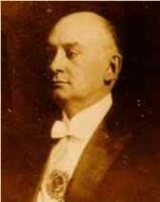
Marcelo Torcuato de Alvear
Encyclopedia
Máximo Marcelo Torcuato de Alvear Pacheco (October 4, 1868 – March 23, 1942), better known as Marcelo T. de Alvear was an Argentine politician
and President of Argentina
from October 12, 1922 to October 12, 1928.
, first Mayor of Buenos Aires. As a politician he became the leader of the anti-personalistic faction of the centrist part of the Radical Civic Union
(UCR) co-founded by Yrigoyen, opposed to some of president Hipólito Yrigoyen
's policies. In contrast to Yrigoyen's popular style, Alvear belonged to the self-appointed "aristocracy" of Buenos Aires
and never tried to hide it. He married opera
singer Regina Pacini.
In 1922, Argentina's president Hipólito Yrigoyen designated Alvear to be his successor. During his term, the economy of Argentina reached a peak performance, which would come to an abrupt halt due to the Great Depression
shortly after his mandate ended.
After the coup against Yrigoyen on September 6, 1930, Alvear gained control of the party and led the unsuccessful opposition to the conservative governments that followed, including the failed revolution of 1932. As a result, he was arrested and deported to Europe. Securing an agreement to the effect from President Agustín Justo in 1935, Alvear returned to Argentina, whereby he became the UCR's nominee for the presidency. Encouraged by favorable results during mid-term elections in 1936, the UCR ran a vigorous campaign ahead of the 1937 presidential election
. Breaking his word to Alvear, President Justo orchestrated what his own party's Governor of the Province of Buenos Aires labeled "one of the most fraudulent elections in history," and the UCR lost to Concordance Party candidate Roberto María Ortiz
, the last Argentine President elected via the system of "Patriotic Fraud."
He died on March 23, 1942.
Politician
A politician, political leader, or political figure is an individual who is involved in influencing public policy and decision making...
and President of Argentina
President of Argentina
The President of the Argentine Nation , usually known as the President of Argentina, is the head of state of Argentina. Under the national Constitution, the President is also the chief executive of the federal government and Commander-in-Chief of the armed forces.Through Argentine history, the...
from October 12, 1922 to October 12, 1928.
Biography
Alvear was the son of Torcuato de AlvearTorcuato de Alvear
Torcuato de Alvear y Saenz de la Quintanilla was a 19th century Argentine conservative politician. He was the son of soldier and statesman Carlos María de Alvear and father of Marcelo Torcuato de Alvear, president of Argentina from 1922 to 1928.In 1880 Buenos Aires was declared the capital city...
, first Mayor of Buenos Aires. As a politician he became the leader of the anti-personalistic faction of the centrist part of the Radical Civic Union
Radical Civic Union
The Radical Civic Union is a political party in Argentina. The party's positions on issues range from liberal to social democratic. The UCR is a member of the Socialist International. Founded in 1891 by radical liberals, it is the oldest political party active in Argentina...
(UCR) co-founded by Yrigoyen, opposed to some of president Hipólito Yrigoyen
Hipólito Yrigoyen
Juan Hipólito del Sagrado Corazón de Jesús Irigoyen Alem was twice President of Argentina . His activism became the prime impetus behind the obtainment of universal suffrage in Argentina in 1912...
's policies. In contrast to Yrigoyen's popular style, Alvear belonged to the self-appointed "aristocracy" of Buenos Aires
Buenos Aires
Buenos Aires is the capital and largest city of Argentina, and the second-largest metropolitan area in South America, after São Paulo. It is located on the western shore of the estuary of the Río de la Plata, on the southeastern coast of the South American continent...
and never tried to hide it. He married opera
Opera
Opera is an art form in which singers and musicians perform a dramatic work combining text and musical score, usually in a theatrical setting. Opera incorporates many of the elements of spoken theatre, such as acting, scenery, and costumes and sometimes includes dance...
singer Regina Pacini.
In 1922, Argentina's president Hipólito Yrigoyen designated Alvear to be his successor. During his term, the economy of Argentina reached a peak performance, which would come to an abrupt halt due to the Great Depression
Great Depression in Latin America
The Great Depression which followed the US stock market crash of 1929 badly affected the countries of Latin America. Before the global Great Depression of the 1930s, links between the United States economy and Latin American economies had been established through US investment in Latin America and...
shortly after his mandate ended.
After the coup against Yrigoyen on September 6, 1930, Alvear gained control of the party and led the unsuccessful opposition to the conservative governments that followed, including the failed revolution of 1932. As a result, he was arrested and deported to Europe. Securing an agreement to the effect from President Agustín Justo in 1935, Alvear returned to Argentina, whereby he became the UCR's nominee for the presidency. Encouraged by favorable results during mid-term elections in 1936, the UCR ran a vigorous campaign ahead of the 1937 presidential election
Argentine presidential election, 1937
The Argentine presidential election of 1937 was held on 5 September. With a turnout of 76.2%, it produced the following official results: aAbstentions.-Background:...
. Breaking his word to Alvear, President Justo orchestrated what his own party's Governor of the Province of Buenos Aires labeled "one of the most fraudulent elections in history," and the UCR lost to Concordance Party candidate Roberto María Ortiz
Roberto María Ortiz
Jaime Gerardo Roberto Marcelino María Ortiz Lizardi was President of Argentina from February 20, 1938 to June 27, 1942....
, the last Argentine President elected via the system of "Patriotic Fraud."
He died on March 23, 1942.

